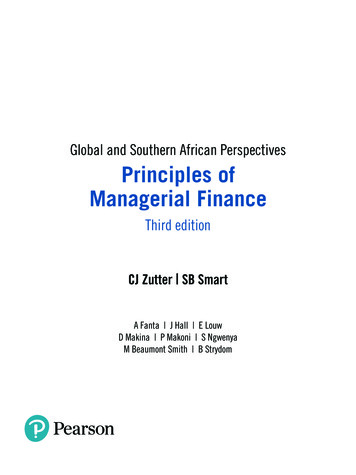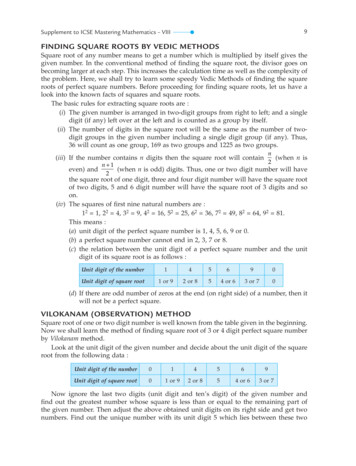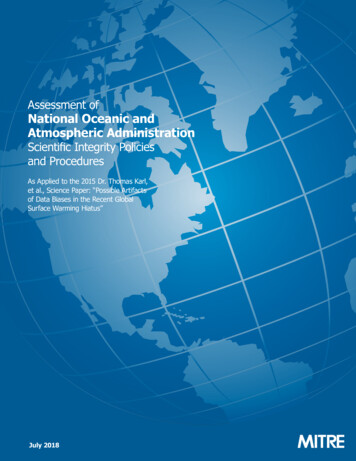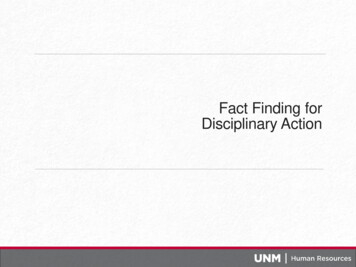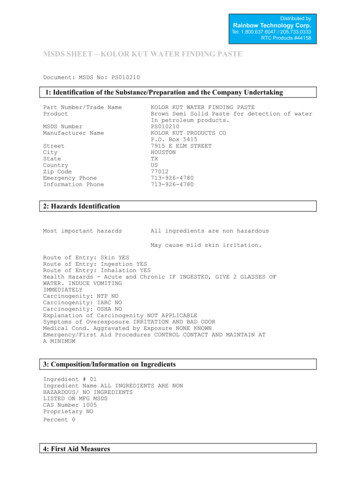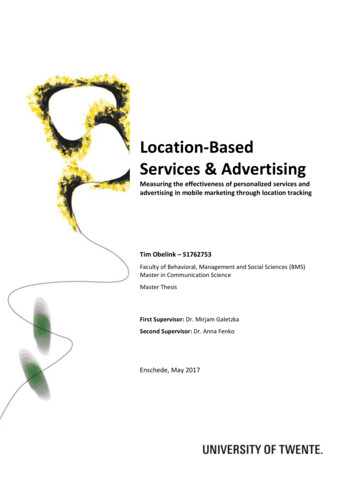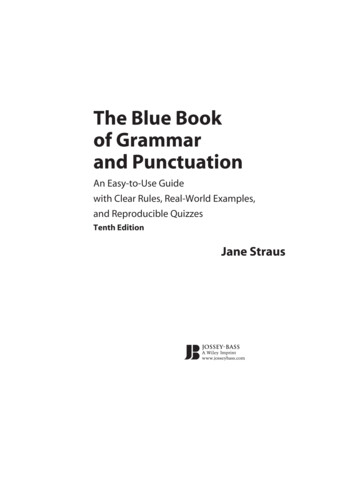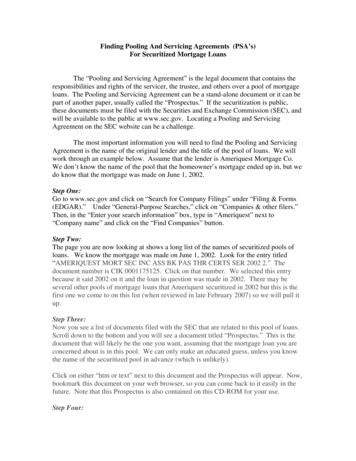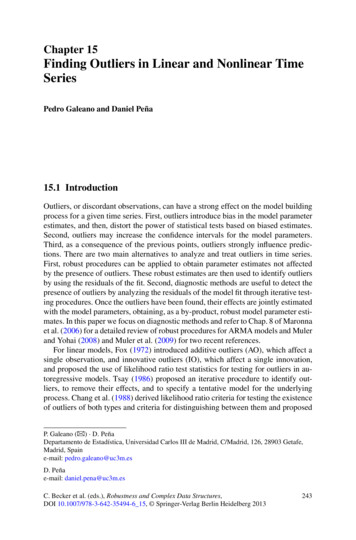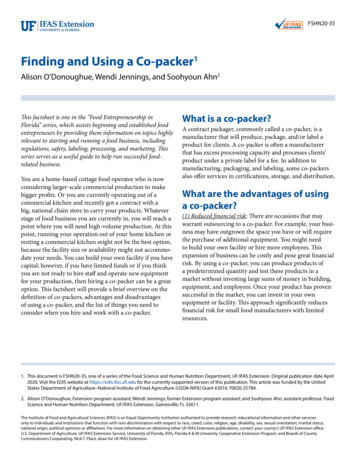
Transcription
FSHN20-35Finding and Using a Co-packer1Alison O’Donoughue, Wendi Jennings, and Soohyoun Ahn2This factsheet is one in the “Food Entrepreneurship inFlorida” series, which assists beginning and established foodentrepreneurs by providing them information on topics highlyrelevant to starting and running a food business, includingregulations, safety, labeling, processing, and marketing. Thisseries serves as a useful guide to help run successful foodrelated business.You are a home-based cottage food operator who is nowconsidering larger-scale commercial production to makebigger profits. Or you are currently operating out of acommercial kitchen and recently got a contract with abig, national chain store to carry your products. Whateverstage of food business you are currently in, you will reach apoint where you will need high-volume production. At thispoint, running your operation out of your home kitchen orrenting a commercial kitchen might not be the best option,because the facility size or availability might not accommodate your needs. You can build your own facility if you havecapital; however, if you have limited funds or if you thinkyou are not ready to hire staff and operate new equipmentfor your production, then hiring a co-packer can be a greatoption. This factsheet will provide a brief overview on thedefinition of co-packers, advantages and disadvantagesof using a co-packer, and the list of things you need toconsider when you hire and work with a co-packer.What is a co-packer?A contract packager, commonly called a co-packer, is amanufacturer that will produce, package, and/or label aproduct for clients. A co-packer is often a manufacturerthat has excess processing capacity and processes clients’product under a private label for a fee. In addition tomanufacturing, packaging, and labeling, some co-packersalso offer services in certifications, storage, and distribution.What are the advantages of usinga co-packer?(1) Reduced financial risk: There are occasions that maywarrant outsourcing to a co-packer. For example, your business may have outgrown the space you have or will requirethe purchase of additional equipment. You might needto build your own facility or hire more employees. Thisexpansion of business can be costly and pose great financialrisk. By using a co-packer, you can produce products ofa predetermined quantity and test these products in amarket without investing large sums of money in building,equipment, and employees. Once your product has provensuccessful in the market, you can invest in your ownequipment or facility. This approach significantly reducesfinancial risk for small food manufacturers with limitedresources.1. This document is FSHN20-35, one of a series of the Food Science and Human Nutrition Department, UF/IFAS Extension. Original publication date April2020. Visit the EDIS website at https://edis.ifas.ufl.edu for the currently supported version of this publication. This article was funded by the UnitedStates Department of Agriculture–National Institute of Food Agriculture (USDA-NIFA) Grant #2016-70020-25784.2. Alison O’Donoughue, Extension program assistant; Wendi Jennings; former Extension program assistant; and Soohyoun Ahn, assistant professor, FoodScience and Human Nutrition Department; UF/IFAS Extension, Gainesville, FL 32611.The Institute of Food and Agricultural Sciences (IFAS) is an Equal Opportunity Institution authorized to provide research, educational information and other servicesonly to individuals and institutions that function with non-discrimination with respect to race, creed, color, religion, age, disability, sex, sexual orientation, marital status,national origin, political opinions or affiliations. For more information on obtaining other UF/IFAS Extension publications, contact your county’s UF/IFAS Extension office.U.S. Department of Agriculture, UF/IFAS Extension Service, University of Florida, IFAS, Florida A & M University Cooperative Extension Program, and Boards of CountyCommissioners Cooperating. Nick T. Place, dean for UF/IFAS Extension.
(2) Professional assistance and resources: Because co-packersare established food processors with years of businessexperience, most co-packers are familiar with foodregulatory requirements, shipping and distribution, andother business needs. Some co-packers have in-house staffand offer services for their clients such as product testing,nutritional labeling, product formulation, ingredientsubstitution, product design suggestion, and other productdevelopment services. Additionally, many co-packers havefood industry contacts and sources, and they can direct youto appropriate professionals who can help with any specificquestions or issues you might have during the production.These resources can be especially valuable for new foodentrepreneurs.(3) Saving time and space: Operating your own productionfacility and overseeing the production requires a significanttime commitment. By working with co-packers, you candevote more time to marketing your products to potentialcustomers. Many co-packers also have proper facilities thatcan store your ingredients and finished products, reducingcosts associated with storage.(4) Facilitating compliance with regulatory requirements:Food regulations under local, state, and federal laws arecomplex, and complying with all aspects of food regulationscan be overwhelming, costly, and time-consuming forbeginning manufacturers. Many co-packers have obtainedthe necessary licenses and permits, have appropriate wastedisposal systems in place, and have completed trainings orcertifications required for their manufacturing operation.By working with a co-packer, you can save money and timeto meet regulatory requirements.What are the disadvantages ofusing a co-packer?One of the disadvantages of using a co-packer is a loss ofcontrol over your product and its manufacturing. You willalso be subject to the co-packer’s production schedule.Most co-packers do not require a customer to be presentduring the production except the first run. This can leadto future production runs that the customer might not befully satisfied with. If there is any dispute or disagreementbetween customers and co-packers, it can delay productionand distribution of products.A co-packer often works with multiple customers for asimilar type of products. Because you need to share sensitive product information with your co-packer, includingingredients, formulations, and product specifications,confidentiality can be a potential problem. If this is the case,Finding and Using a Co-packeryou might consider obtaining a confidentiality agreementwith the co-packer to protect sensitive information aboutyour product.How should I select a co-packer?Because a co-packer can run full scope of production,from ingredient receiving and manufacturing to labelingand packaging (and even shipping to your customers), it iscritical to choose the best co-packer for your food product.Before meeting with the co-packer, prepare a detailed business plan. This business plan should include your businessgoals and objectives, product description, marketing plan,and financial plan (Ahn et al. 2017). Writing a business planwill give you an opportunity to review your business goalsand marketing plan and help you assess the appropriate sizeof the order. Reviewing your business goals will facilitatefinding a co-packer who has the same business mindset andcan meet your specific needs. In addition, write detailedprocess instructions with specifications for ingredients,packaging, and labeling as well as any relevant regulatoryrequirements. It is important to have a well-developed ideaof what you want for your product before meeting withpotential co-packers.If you have identified several potential co-packers, bringyour process instructions and business plan to your firstmeeting. It will help to create a checklist or a list of questions for the meeting. Some of the questions you should askinclude:1. What size and type of packaging am I interested in for myproduct?Certain co-packers may only specialize in one type offood or container size. For example, if the product youare looking to produce is a hot sauce, you would need aco-packer who can package liquids into small bottles. Youmight need to know if they can hot fill or are capable ofaseptic filling and other specific production needs uniqueto your product.2. What is the minimum production the co-packer is willingto do?In general, larger co-packers will only produce greateramounts of a product, whereas smaller co-packers offersmaller production runs.2
3. What is the specific cost for processing and handling yourproduct?Be sure to specifically ask the price for the co-packer’sservice. You can ask if they can offer a guaranteed pricefor a year or other certain terms. Make sure there are nohidden fees.4. Can the co-packer produce your product the way you wantit to be made?If your product requires special preparation techniques,ingredients, or storage, ensure that the co-packer can followyour specifications.5. If applicable, can the co-packer provide the certificationsyou need?If you want your product to be Kosher, Halal, organic,gluten-free, or non-GMO certified, you will need to find aco-packer who can provide those certifications.6. Will this co-packer be able to assist in product design anddevelopment?If your product is not quite ready for the shelf, you canbenefit from product development services. Ask if the copacker has staff or offers services for product development,including product testing, nutritional labeling, productformulation, ingredient substitution, and product design.Using the co-packer’s in-house product developmentservices can save considerable time and costs.7. What is the co-packer’s safety and quality policy?Touring the co-packer’s facility can answer manyproduction-related questions as well as give insight to thecleanliness, safety, and potential hazards of the facility. Youcan also ask for the most recent inspection report and theirfood safety systems (e.g., Preventive Controls, HACCP)or quality control systems, if they have any. A co-packershould have a list of clients. If possible, contact a currentclient to discuss their experiences, and try one of theproducts manufactured by the potential co-packer.8. What is my production timeline?Production schedule is an important factor to considerwhen you work with a co-packer. You should carefullycommunicate with the co-packer on scheduling so you willnot be stuck in a production hold, which could jeopardizeyour business. Many co-packers ask their clients to confirmFinding and Using a Co-packerthe production at least a month or more in advance. Youmight need to ask how the co-packer handles “emergency”product demands (e.g., holiday season) and if they havethe equipment/personnel resources to handle unexpecteddemands, and at what cost.9. Will the co-packer handle growing demands in the future?When you meet a co-packer, you also need to think aboutfuture needs. Early in the production, you may need onlysmall production runs, but once your business grows, youmay need more volume. You have to make sure this copacker can accommodate high-volume orders in the future.10. Can the co-packer provide assistance with ordering andstorage of ingredients and supplies?One of the main reasons to work with a co-packer is alack of facilities. You may need storage space for youringredients, supplies, or finished products. Ask potentialco-packers if they can provide storage space. Also ask theco-packer if they can directly order ingredients and suppliesor if you need to order and ship them to the co-packer.Some co-packers can introduce you to brokers or distributors that you can work with. Other factors you need toconsider are: A confidentiality agreement The financial stability of the co-packer The location of the co-packerOnce you have identified a co-packer for your product,you should write a contract to ensure your product ismanufactured according to your specifications in a timelymanner. In general, a contract should contain the followingelements: The parties involved The quantity of product to be produced The quality of product to be produced (including specifications you require) The timeline for the production to be completed The price to be paid (including payment method andwhen the payment is due)It is recommended to have your attorney and potentiallyyour accountant review the contact before you sign. Yourattorney can ensure that the terms are satisfactory and thatyou are legally and financially protected if any problemoccurs.3
Where can I find a co-packer nearme?Having a co-packer that is geographically close to you allows you to have a more active role in the production. However, it is not uncommon for a food entrepreneur to workwith co-packers in other states, especially if your producthas special needs (e.g., specific equipment, certifications,etc.). You can get information about co-packers by talkingto other food entrepreneurs. State and national associationmeetings, food shows, and trade shows can also be goodplaces to meet co-packers. Other good resources includefood industry trade publications and directories, becausemany specialized co-packers advertise through them. If youlook for more local co-packers, university Extension officescan also be a resource for locating a co-packer.There are several websites that provide the national copacker directory: Specialty Food Co-Packers Directory: y.html The Association for Contract Packagers & Manufacturers:https://www.contractpackaging.org (select MemberDirectory at the tab menu)Below is a noncomprehensive list of co-packers locatedin Florida and Georgia. The list is simply for informationpurposes, and it does not constitute or imply an endorsement or recommendation by the authors or UF/IFASExtension. For details, contact the company directly.FloridaAll Wrapped Up3714 Northwest 16th StFt. Lauderdale, FL 33311Phone: (800) 891-2194Fax: (954) 587-2144Email: info@allwrappedup-gifts.comWebsite: http://www.allwrappedup-gifts.com/Processing: chocolate, other candy and snacks, specialtyfood packagingAl-Rite Bottled Ideas18524 NW 2nd AveMiami, FL 33179Phone: (305) 652-2540Fax: (305) 652-4478Email: info@al-rite.comWebsite: http://www.al-rite.comProcessing: liquid beverages, concentrates, sauces, teas,drink mixesFinding and Using a Co-packerAshlynn’s Gourmet22105 US Hwy 19NClearwater, FL 33765Phone: (727) 687-3267Email: t.com/co-packing-services/Processing: saucesAzure Water1903 Greenleaf LaneLeesburg, FL 34748Phone: (352) 728-5646Email: ing: bottled waterBeneficial Blends, LLC5505 Johns Rd., Ste. 704Tampa, FL 33634Phone: (800) 230-5952http://beneficialblends.com/Processing: liquid and semiliquid productsBest Brand Bottlers6620 19th Street EastSarasota, FL 34243Phone: (943) 755-1941Fax: (943) 755-1213Email: ottlers.com/Processing: salad dressings, marinades, BBQ sauces, pastasauces, hot sauces and cocktail saucesBeverage Corporation International, Inc.3505 NW 107th StMiami, FL 33167Phone: (786) 413-0530http://bcibeverages.com/Processing: sodas, juices, waters, energy drinksCriollos Food, Inc.3675 NW 67th AveMiami, FL 33147Phone: (305) : dry beans, peas, wheat, flours, cornmeal4
Endorphin Farms, Inc.3255 Parker DriveSt. Augustine, FL 32084Phone: (904) 824-2006Fax: (904) 824-4014http://www.bottle-my-sauce.comProcessing: saucesG. S. Gelato1785 FIM BoulevardFort Walton Beach, FL 32547Phone: (850) 243-5455Fax: (850) 243-5443Email: : gelato, sorbet, dessertsH&H Products Company6600 Magnolia Homes RoadOrlando, FL 32810Phone: (800) 678-8448Email: mpany.com/contract-packaging/Processing: beverage, juice concentrates, syrupsHouse Autry2732 Hibiscus DriveEdgewater, FL 32141Phone: (386) labelProcessing: dry blends (seasonings, marinades, sauces)IPAC Inc. (International Packaging of Authentic Cuisine)1270 Belle Avenue, Unit 115Winter Springs, FL 32708Phone: (407) 699-7507Fax: (407) ng: sauces/salsas, soups, dressings, cocktail mixersKitchen Fusions6349 82nd Ave NPinellas Park, FL 33781Phone: (727) 546-3444Fax: (727) 934-9967Email: -us/Processing: sauces, dips (dry blending only)Finding and Using a Co-packerMarina Foods, Inc.11125 NW 124th StMedley, FL 33178Phone: (786) 888-0129Fax: (786) 888-0134Email: ocessing: cooking oils, salad dressings, saucesOld Meeting House Ice Cream4004 South MacDill AvenueTampa, FL 33611Phone: (813) 248-3151, Ext 110Fax: (813) cessing: ice cream, soy cream, gluten freePalmetto Canning Co. Inc.3601 US Hwy 41Palmetto, FL 34221Phone: (941) 722-1100Email: .comProcessing: dietary supplements, marinades, sauces,dressings, cooking wines, jellies and marmaladesPals Group, Inc. (Lakay)5761 NW 37th Avenue, Suite 101Miami, FL 33142Phone: (305) 638-7355Fax: (305) : grains, condiments, beverages, canned goods,oils, juices, saucesThe Sauceology Group14221 60th Street NorthClearwater, FL 33760Phone: (727) 599-0631https://thesauceologygroup.com/Processing: sauces, spice blends, rubs, salsas, dressings,marinadesSoutheast Bottling & Beverage15340 Citrus Country DriveDade City, FL 33523Phone: (352) 567-2200Fax: (352) 567-2257https://southeast-bottling.com/Processing: water, juices, teas, energy drinks, kosher,organic5
Stage Coach Sauces806 N Beach StreetDaytona Beach, FL 32114Phone: (386) 328-6330Email: es.comProcessing: sauces, condiments, dressing, syrupsSt. Armands Baking Company2811 59th Avenue Drive EastBradenton, FL 34203Phone: (941) ing: bread and roll bakery productsTiller Foods3803 E Columbus DriveTampa, FL 33605Phone: (813) 739-2111http://www.tillerfoods.comProcessing: yogurt, sour cream, cream, buttermilk, whipping cream, ice cream and dairy mixes, dessert mixes,coffee creamer, Pareve (Parve) and KosherWilliams & Bennett Fine Foods1815 Cypress Lake DrOrlando, FL 32837Phone: (561) 276-9007Email: om/Processing: candies, chocolatesGeorgiaBraswell’s Foods, Inc.226 N Zetterower AveStatesboro, GA 30458Phone: (800) 673-9388Email: ads/Braswell-Catalog-8.pdfProcessing: jams, jellies, dressings, marinades, sauces,honeys, toppingsCountry Ranch Foods1460 Field Park CircleMarietta, GA 30066Phone: (770) 792-9000/(888) 653-5550Fax: (770) bel.htmlFinding and Using a Co-packerProcessing: kettle items (gravies, sauces, soups, stews,chitterlings, broths), oven items (baked, dried, smoked andsteamed chicken, roast, sausage, turkey), raw items (bulksausage, sausage patties and links)Custom Beverage Concepts344 Golf Course RdTallapoosa, GA 30176Phone: (770) 574-9899Email: rocessing: hot and cold beverages, sweetener, creamer,protein shakesD&D Foods, Inc.3715 4th AvenueColumbus, GA 31904Phone: (706) 322-4507Email: g: saucesDessert Innovations25-B Enterprise BlvdAtlanta, GA 30336Phone: (800) 359-7351/(404) 691-5000Fax: (404) 691-5001Email: ons.com/about-us/Processing: dessert products, trufflesDillon Candy Company19927 HWY 84 EBoston, GA 31626Phone: (800) 382-8338Fax: (229) 498-2201http://www.dilloncandy.comProcessing: Confections, candiesGeorgia Spice Company3600 Atlanta Industrial ParkwayAtlanta, GA 30331Phone: (800) 453-9997Email: ing: dry blends (dressing, drink mixes, marinades,rubs, batters, seasonings)6
Hillside Orchard Farms18 Sorghum Mill DrLakemont, GA 30552Phone: (866) 782-4995Email: ard.comProcessing: jams, jellies, dressings, sauces, juices, salsa,syrup, pickles, relishHogwaller BBQ3414 Lee RdHoboken, GA 31542Phone: (912) 550-6494Email: co-packingProcessing: saucesReferences and ResourcesAhn, S., A. O’Donoughue, L. House, and R. GoodrichSchneider. 2017. How to Start a Food Business: Writinga Business Plan. FSHN14-12. Gainesville: University ofFlorida Institute of Food and Agricultural Sciences. https://edis.ifas.ufl.edu/fs259.The Association for Contract Packagers &Manufacturers. 2018. CPA Member Directory. d a2n4P0000003FHHBrady, P. L., S. Seideman, and J. R. Morris. 2009. Choosingand Using a Co-packer. Research Report 985. ArkansasAgricultural Experiment Station. g, J. E. 1998. Choosing and Using a Co-packer.FSE98(10-99). North Carolina State University. neurs copackers.pdfSmith, D. 2014. “Preparing for High-Volume Food ProductSales: Are You Ready for a Co-packer?” Michigan StateUniversity Extension. http://www.canr.msu.edu/news/preparing for high volume food product sales areyou ready for a co packerSpecialty Food Co-packers Directory. 2018. y.htmlSpecialty Food Resource. 2018. “Co-packers.” ind-a-business-resource/copackers/University of California-Davis. 2016. “California FoodProcessing Co-packers.” iversity of Georgia Extension Food Science OutreachProgram. 2016. “Suggested Contacts for Private LabelCo-packing.” -2016-R.pdfUniversity of Massachusetts Extension. 2014. ss.edu/files/food-science/copackers aug2014.pdfCornell Food Venture Center. 2018. “Small Copackers & Commercial Kitchens.” comb, R. 2008. Food Processing Using a Co-packer.FAPC-106. Stillwater, OK: Oklahoma Cooperative Extension Service. Document-970/FAPC-106web.pdfHood, K. 2009. Consider a Co-packer: A Risk ManagementTool. Publication 2565. Mississippi State University Extension Service. ublications/publications/p2565.pdfFinding and Using a Co-packer7
States Department of Agriculture-National Institute of Food Agriculture (USDA-NIFA) Grant #2016-70020-25784. 2. Alison O'Donoughue, Extension program assistant; Wendi Jennings; former Extension program assistant; and Soohyoun Ahn, assistant professor, Food Science and Human Nutrition Department; UF/IFAS Extension, Gainesville, FL 32611.
